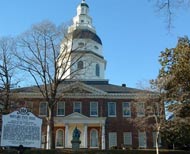4/8/2008
Revenue Concerns Derail Maryland, Washington Photo Ticketing ExpansionProfit concerns thwart photo ticketing expansion in Maryland and Washington state.

Concerns over the disposition of profits have thwarted efforts to expand photo ticketing in Washington state and Maryland. Statewide use of speed cameras on local roads and freeway "construction zones" was essentially a done deal after Maryland Governor Martin O'Malley (D) introduced proposals that received 2-1 support in the state House and more modest support in the state Senate (view legislation). The legislature adjourned for the year yesterday without presenting a final version of the legislation to the governor. Members could not reconcile differences regarding revenue during intense late-night negotiations.
Currently speed cameras are only authorized for use in Montgomery County where $7.5 million in profit has been raised by placing cameras on roads with high traffic volume, but no significant accident history. Lawmakers deadlocked over whether localities or the state should pocket the millions in revenue generated by tickets that some wanted boosted from $40 to $75. O'Malley is likely to reintroduce the proposal next year.
In Washington state, the fear of a voter initiative has frozen the interest of many cities in installing new red light camera systems. Among its many provisions, Initiative 985 would, if enacted, force municipalities to send all profit from photo tickets to a statewide fund dedicated to congestion relief (view initiative details). The mere prospect of passage appears to have persuaded the cities of Aberdeen Mill Creek and Yakima to drop, for now, plans to install the devices.
I-985 sponsor Tim Eyman suggested that the voter initiative would have the same effect in Washington state that a North Carolina Supreme Court decision had in the Tar Heel state. There, the high court chose to enforce a state constitutional provision directing all ticket revenue out of municipal coffers and into the public school system. After this ruling, Charlotte, Fayetteville, Greenville, Greensboro, High Point and Raleigh shut down their red light camera programs.
Supporters of the ReduceCongestion.org initiative are busy collecting the 225,000 signatures needed by July in order to put the initiative on the November ballot.


